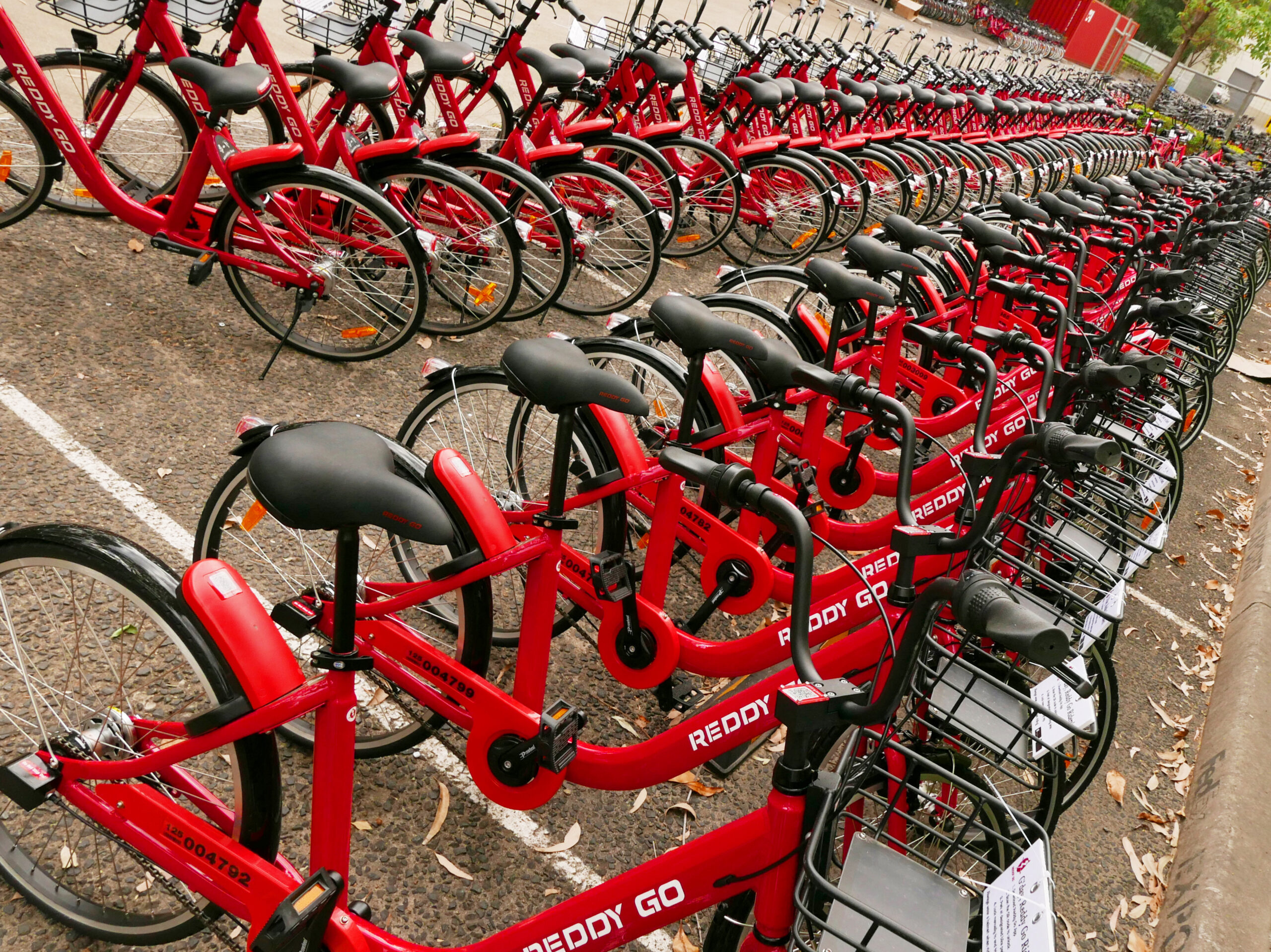
Authorities tyre of hire bikes

BY ALEC SMART
Dockless rental bicycles risk being impounded in future if they obstruct pedestrians after several inner city councils called for better monitoring and retrieval.
Facing a clampdown are Singapore’s silver & yellow OBikes and China’s all-red ReddyGo hire bicycles – costing $1.99 per half hour and unlocked by a smartphone app – that in the last few months became ubiquitous around Sydney.
Often found hanging from trees or submerged in canals like their shopping trolley cousins, it is the trip-risk to pedestrians when dockless bicycles clutter footpaths that is driving authorities to act.
On October 10 Randwick Council passed a motion to request OBike and ReddyGo to “provide and use designated bike parking areas to reduce vandalism and clutter caused by the recent proliferation of the bikes.”
Randwick Mayor Lindsay Shurey stated, “I’m a big supporter of cycling and I think there’s a role for bicycle hire in our city. We need to get it right and from what I’ve seen, the current bike hire system isn’t working.
“They seem to be ridden by visitors to get to the beaches and then they lay strewn across our suburbs. They’re dumped randomly next to the road, they’re piling up at our beaches and they’re being vandalised and damaged.
“These problems stem from the fact there is no obligation for the hirer to return the bike to an appropriate and secure location.
“We’ll be seeking an agreement with the operators that they fund and implement appropriate bike parking locations, or face financial penalties.”
Inner West Council Mayor Darcy Byrne also issue a statement on October 13, revealing plans to meet with councilors from Randwick, Waverly and Woollahra Councils and the City of Sydney to develop a system of regulation for the whole of the inner city area.
“We need a consistent regulatory framework across the metropolitan area,” said Cr Darcy. “We have to protect the safety and accessibility of our footpaths and roads.”
The central problem with the rental bicycles is that most journeys are singular, taken from where they’re found, typically outside a venue or within the CBD, to the user’s home or a tourist attraction. Unlike traditional cycle hire facilities, such as Centennial Park, where users cruise around before returning the bike to a depot, rental bicycles are dumped at their destination.
“People are just parking bikes wherever they finish their journey,” said Cr Byrne. “Councils need to come together across Sydney to figure out a consistent way to allocate spaces for bike parking.
“We need simple and sensible rules of the road which will protect the accessibility of streets across Sydney, whilst allowing bike share operators to succeed and grow.
“Allowing a free-for-all with no allocated parking or protections for residents will only result in the industry losing popularity and losing patronage.”
City Hub research suggests the most ardent opponents of the rental bicycle scheme are themselves non-cyclists. In a city with limited and often poorly maintained cycle paths, where many cyclists claim motorists actively deter their presence on public roads, it is perhaps not surprising that the introduction of literally thousands of new bikes has irritated conservative thinkers.
Australia’s culture of intolerance limits their acceptance. There are Facebook pages encouraging people to post photos of the bicycles dumped in bizarre locations and multiple reports of bikes being vandalized.
Just last weekend, on 14th October, ‘pranksters’ piled up 10-15 OBikes in a pyramid on Waverley Oval near Bondi Junction.
It will be interesting to analyse bicycle store sales at the end of this financial year to determine if the deluge of rental bikes has negatively impacted on sales of new bikes, revealing whether consumers prefer to hire than buy.
Across Asia, photographs are emerging of literally thousands of rental bicycles clogging up footpaths of city centres, having reached peak usage.
OBikes are trying to smooth their path to public acceptance with charitable actions, spokesperson Chethan Rangaswamy revealed to City Hub.
“We are confident to drive awareness with the public through charity events, donating 100% of our proceedings from OBike rides in Sydney to the Children’s Cancer Institute [an event on October 20], Ride To Work sponsorship with Bicycle Network.. [whilst] at the same time increase our ‘boots on the ground’ to effectively manage the orderly usage of OBikes by the community at large.
“We will also be working closely with the local Councils to increase public awareness about bike-sharing for the community.”
A third dockless bicycle hire firm, Ofo, from China, are also set to invade Sydney soon, introducing an all-yellow bicycle to our crowded streets.
Last week financial data analysis firm Bloomberg published rumours that Ofo might merge with an even larger dockless bicycle firm, Mobike, from Singapore, which has already flooded Asia with their silver and orange machines and claims 30 million riders in 180 cities. Together they would create a behemoth international cycle hire corporation that might ultimately dominate every major city in the world.
Despite the positive aspects of the rental bicycles – encouraging people to exercise, making it easier, cheaper and safer to travel home short distances from late night venues, and facilitating tourism – the problem of their ending up in areas where they’re effectively dumped does not go away.
Ofo, which has 10 million bicycles in 13 countries, declare they have solutions to the congestion problem, and these include ‘geofencing’ and punishing users who fail to leave bicycles in marked parking zones, such as yellow rectangles painted on paths.
Ofo proclaim they will introduce a credit system based on rewards and penalties that deduct points if users transgress rules.
Ofo Australia’s head of strategy, Scott Walker, confirmed his company will introduce a ‘geofence’, on their app. This warns a user if they ride outside an area Ofo is licensed to operate within, and will deduct 20 points from the user’s credit score if they persist. Ofo’s app will also indicate ‘preferred parking’ sites in which to leave the bicycle after use.
Ofo also plan to enact a ‘rapid response’ team to retrieve abandoned bicycles – tracked by onboard satellite technology – and return them to more popular zones.









